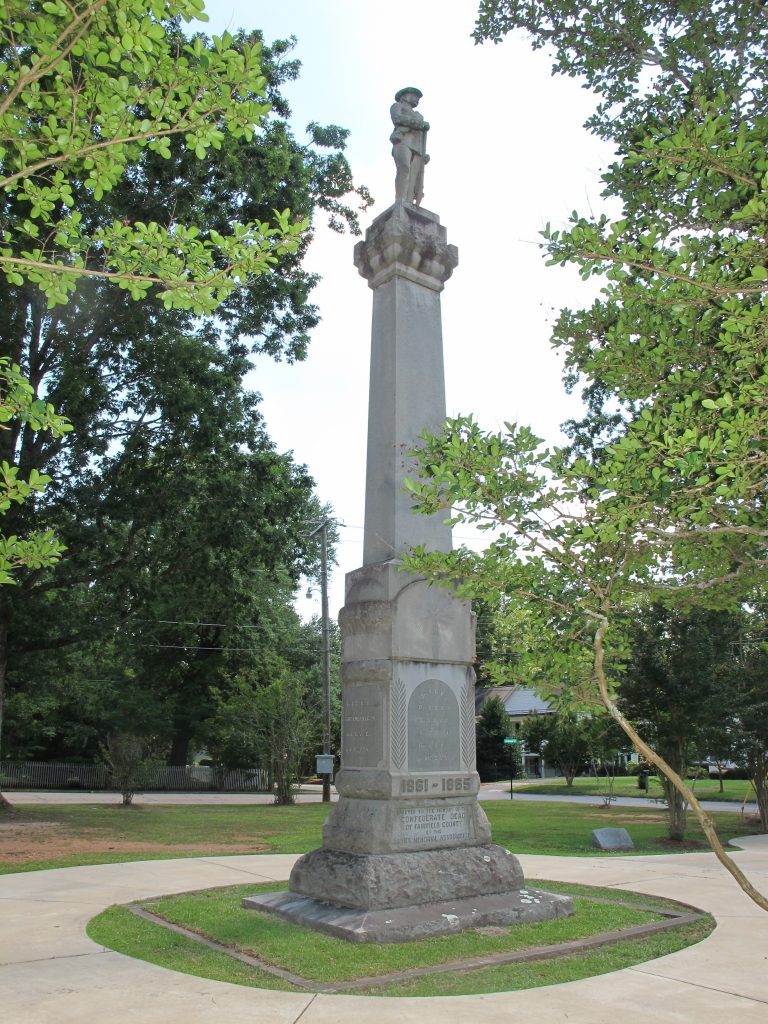WINNSBORO – There is currently a law in South Carolina that protects, in part, certain monuments from being removed from public property in the state without a vote by the General Assembly.
Winnsboro Mayor Roger Gaddy said during town council meeting Tuesday night that the town government does not intend to break that law. Following a lengthy executive session about the legalities of moving the town’s confederate monument, council voted 5-0 to authorize Town Manager Don Wood to explore suitable options for relocating the monument.
The monument, which sits on the far corner of the Mt. Zion Institute grounds from the former school building, is one of three kinds of monuments that the Heritage Act is designed to protect – those erected for Native Americans, African Americans and war memorials.
The town’s confederate memorial is a war memorial.
To be protected by the Act, monuments must also be located in a public area, according to an opinion by S.C. Attorney General Alan Wilson.
While the issue of the confederate monument has smoldered in some Winnsboro neighborhoods for years, the discussion caught fire last month when the Fairfield County NAACP President Jennifer Jenkins wrote a passionate editorial that appeared on the front page of The Voice, calling for the removal of the monument from the Mt. Zion property – a property that will soon be home to the county offices.
Jenkins said it would be offensive for county employees to have to go to work there in sight of what many in the community consider a monument to slavery.

“We’re not moving it [right now],” Gaddy said. “We’re just exploring our different options and how to legally apply those options. We’re not going to do anything illegal,” he said. “I don’t know where we can move it. I don’t know how much it will cost to move it. I don’t know who moves it. I do know we have to get permission from the state legislature to move it. But before I would ask permission from the legislature to do that, I would want to be able to tell them what we’re going to do with it.”
County Administrator Jason Taylor said in a County Council meeting last month that the county would be glad to help the town government with the expenses of moving the monument to a more suitable location.
While SC Attorney General Wilson has said he is prepared to defend the constitutionality of the Heritage Act, he has also said the part of the law that requires a two-thirds vote of the General Assembly in both the House and the Senate to remove a protected monument might be found unconstitutional if challenged since the General Assembly passes legislation with a simple majority.
Gaddy said he doesn’t expect the legislature to take the matter up until they come back into regular session on Jan. 3.
“There is a lawsuit in the courts now that’s trying to declare the Heritage Act unconstitutional,” Gaddy said. “It may be that they (legislature) may not have an Act to deal with when they come back. So, we’re going to see what avenues we have that are appropriate for us, legally, and to get the information that we need so that whenever the time comes, if we are able to move it, then we’ll have everything ready to go.”
Gaddy said to get approval from the legislature to move the monument, the county’s legislative delegation would have to request approval of the General Assembly. A two-thirds vote is required for passage.
As Gaddy was calling for adjournment of the meeting, Councilman Danny Miller interrupted him, saying he wanted to thank the mayor and council for its work on the issue.
“I want you to know, with this situation, we appreciate you,” Miller said.
“I appreciate all of our council members,” Gaddy said. “We’re fortunate in Winnsboro to have a good town council. We work together really well. There’s almost never any acrimony. Everything is usually done in a very civil, cordial and professional way.”
Following the meeting, Miller, one of two African Americans on council, commented that he’s proud of how well the council has worked collaboratively on the issue of the monument and wanted to assure the community that council is working toward a goal.
“Out of love and care, we’re going to come up with a good solution to this problem. We’ll work together for the good of the whole community,” Miller said.
Asked when a decision might be reached about what to do with the monument, Councilman Demetrius Chatman, council’s newest member, said council has now put it in the hands of the town administrator to research where the monument should be moved to.
“We had a really good discussion in executive session. But whatever we decide to do with it, we still have to find out what the legislature is going to do. We’re not going to break the law,” Chatman said.
Chatman said that council was advised by legal counsel that even though the statue was moved some years back from the center of Congress Street in front of the town clock to its present location, its movement is still governed by the Heritage Act.
“We can’t move it without approval from the General Assembly,” he said.










